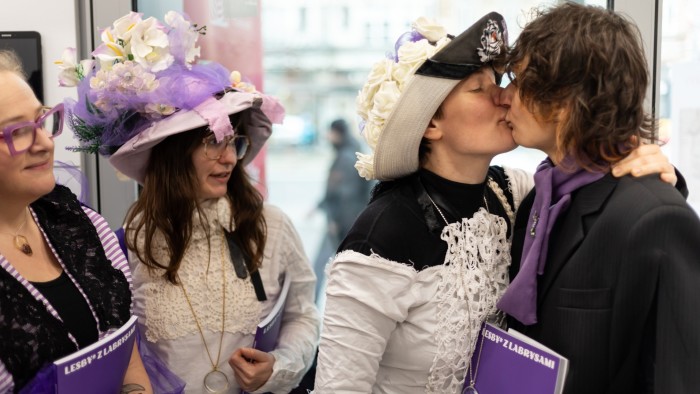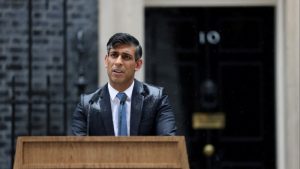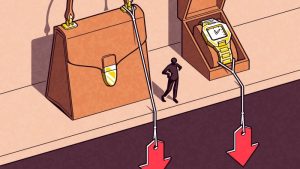Warsaw’s QueerMuzeum defies anti-gay hostility in Poland

Unlock the Editor’s Digest for free
Roula Khalaf, Editor of the FT, selects her favourite stories in this weekly newsletter.
At the inauguration of Poland’s first queer museum, Tomasz Kowalski was savouring a milestone for his LGBTQ community.
“This feels special, like being part of something that most probably would never have happened in Poland 10 years ago,” said the 21-year-old student, one of many guests crammed into the small exhibition space. “It’s not the best day to see properly this museum, but it feels really cozy to be here with many other people.”
Warsaw’s QueerMuzeum has opened one year after Poland’s prime minister Donald Tusk and his pro-EU coalition ousted the rightwing Law and Justice (PiS) party. Under the previous government, Poland was considered the worst country in the EU to be gay. Municipalities were allowed to declare themselves LGBTQ-free zones.
This compact, brightly-lit museum is a grassroots project designed to counter that oppression. Housed in a former bank on Marszałkowska, one of the capital’s busiest streets, entry is free. Inside, a display of 150 documents, photos and artefacts tells the story of the country’s LGBTQ history.
Lambda, an LGBTQ association, launched the project two years ago. In addition to crowdfunding and corporate donations, it received a start-up grant of 150,000 zlotys (€35,000) from Warsaw’s city hall — a sign of local authorities hoping to bolster Poland’s capital as a bastion of liberalism. Lambda’s archives will be placed in the upstairs library, reached by a white spiral staircase.
Some of the displays highlight periods when Poland enacted apparently progressive laws but failed to protect the gay community. In 1932, the country decriminalised homosexuality and its postwar communist regime removed some anti-gay legislation. Yet gay people could still be kept under surveillance and were sometimes detained by the communist police for allegedly subversive activities.

Gay people in Poland still face discrimination. Tusk has failed to deliver on his promise to legalise same-sex partnerships within his first 100 days in power. His social reform agenda has prompted tensions within his own coalition, which includes conservative lawmakers who are strong defenders of Catholicism.
Last month, the UN’s independent expert on protection against gender violence and discrimination, Graeme Reid, called on Polish lawmakers to enact stronger LGBTQ rights.
“The current government isn’t outspokenly homophobic and doesn’t use hate speech like the previous one, but on the other hand Tusk and his coalition have not fulfilled all their campaign promises,” said Jakub Gawkowski, an art historian and curator who sits on the queer museum’s planning council. “Perhaps our politicians are hypocrites, but I think they are also simply scared of losing part of their more traditional electorate, which is why they are not giving legal rights to same-sex couples.”
A few attendees arrived at the museum’s opening in costumes to highlight Poland’s queer history and heritage. Karolina Micuła dressed as 19th-century poet Maria Konopnicka, also known as an activist for Polish independence and women’s rights, while her partner Ewa Kamoda came as Maria Dulębianka, a painter with whom Konopnicka had a relationship.
“This is a museum, so we wanted to show it’s nothing new to be lesbians in Poland,” said Micuła. “Every Polish schoolchild learns about Maria Konopnicka’s nationalistic poems, but nobody gets taught that she loved another Maria.”
Further change is expected. Last month, Warsaw’s liberal mayor Rafał Trzaskowski was selected as presidential candidate to replace outgoing president Andrzej Duda, a PiS nominee who has accused the LGBTQ movement of promoting “an ideology.”
Performance artist Szymon Adamczak, who recently returned to Poland after eight years in Amsterdam, said young people in Poland were not that far apart from those in Amsterdam. “I also think Polish society is more progressive than its politicians,” he said. “Not only on [gender] rights but also because it is more pro-European Union.”
#Warsaws #QueerMuzeum #defies #antigay #hostility #Poland




